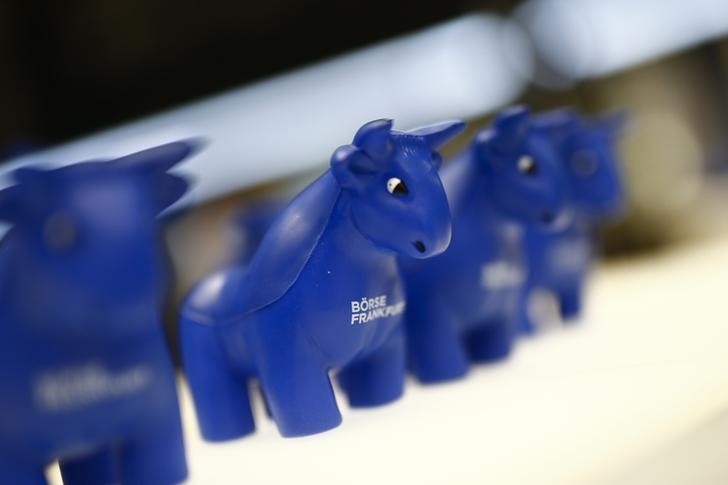Investing.com – European stock markets rallied on Monday as equities breathed a sigh of relief over the outcome of the presidential elections in France, pushing the German benchmark index to an all-time high just below 12,400 points.
Nearing midday trade in Europe, the benchmark Euro Stoxx 50 jumped 3.64%, France’s CAC 40 soared 4.31% while Germany’s DAX 30 traded up 4.80%.
Centrist candidate Emmanuel Macron won the first round of the French presidential election with 23.75% of the vote, advancing to the second and final vote with far-right Marine Le Pen who took 21.53% which will take place on May 7.
Euro-friendly Macron is widely tipped to win the final vote, with opinion polls showing him comfortably beating Le Pen by around 20 percentage points, reducing the risk of an anti-establishment shock in the final round.
The euro jumped to five-month highs against the dollar as investors breathed a sigh of relief, though an upset by Le Pen who wants to leave the single currency still remains a possibility.
EUR/USD was at 1.0872 by 5:41AM ET (9:41GMT) after going as high as 1.0920 overnight, the most since November 11.
Similarly, the spread between the yield on the France 10-Year and that of the benchmark Germany 10-Year crashed below 50 basis points as the risk of France leaving the European Union was considered to have faded.
Even as risk appetite pushed European stocks to record highs, safe haven assets sank on Monday.
Comex gold futures shed $15.86, or around 1.23%, to $1,273.24 a troy ounce by 5:42AM ET (9:42GMT).
The yellow metal fell by as much as 1.8% earlier to a session low of $1,266.00, the weakest since April 11.
The yen also saw a sell-off against the dollar with the USD/JPY, topping 110 for the first time in nearly two weeks.
Outside of the French elections and on a light day for economic data, German business morale hit its highest level in over five years. According to the German Ifo, its business climate index rose to 112.9 in April, its best reading since July 2011.
Meanwhile, oil prices recovered somewhat on Monday, coming off of steep weekly losses of nearly 7%.
Limiting upside, investors remained concerned amid signs of further gains in U.S. crude output.
U.S. drillers last week added rigs for the 14th week in a row, data from energy services company Baker Hughes showed on Friday, extending a 10-month drilling recovery.
That brought the total count to 688, the most since September 2015, underlining concern that an ongoing rebound in U.S. shale production could derail efforts by other major producers to rebalance global oil supply and demand.
Energy stocks were broadly higher, as French oil and gas major Total SA (PA:TOTF) jumped 3.78% and Italy’s ENI (MI:ENI) gained 1.31%, while Norwegian rival Statoil (OL:STL) rose 1.13%.
Financial stocks also traded with sharp gains, as French lenders BNP Paribas (PA:BNPP) and Societe Generale (PA:SOGN) soared 8.45% and 9.54%, respectively, while Germany’s Commerzbank (DE:CBKG) and rival Deutsche Bank (DE:DBKGn) rival skyrocketed 9.35% and 7.26%, respectively.
Among peripheral lenders, Italy’s Intesa Sanpaolo (MI:ISP) gained 7.00% and Unicredit (MI:CRDI) jumped 10.78%, while Spanish banks Banco Santander (MC:SAN) and BBVA (MC:BBVA) traded up 4.97% and 5.53%, respectively.
In London, the commodity-heavy FTSE 100 participated in the risk-on sentiment and gained 1.84%.
Shares in Glencore (LON:GLEN) rose 2.39%, Anglo American (LON:AAL) advanced 2.10%, while BHP Billiton (LON:BLT) traded up 3.10% and Rio Tinto (LON:RIO) traded up 2.32%.
Energy stocks recorded gains, as BP (LON:BP) rose 1.95% and rival Royal Dutch Shell (LON:RDSa) was up 2.55%.
Financial stocks were also higher, with shares in HSBC Holdings (LON:HSBA) up 1.83% while the Royal Bank of Scotland (LON:RBS) gained 2.63%. Lloyds Banking (LON:LLOY) and Barclays (LON:BARC) traded up 2.61% and 4.79%, respectively.
In the U.S., futures pointed to a higher open. The Dow Jones Industrial Average futures gained 0.97%, S&P 500 futures advanced 1.12%, while the Nasdaq 100 futures traded up 1.06%.
